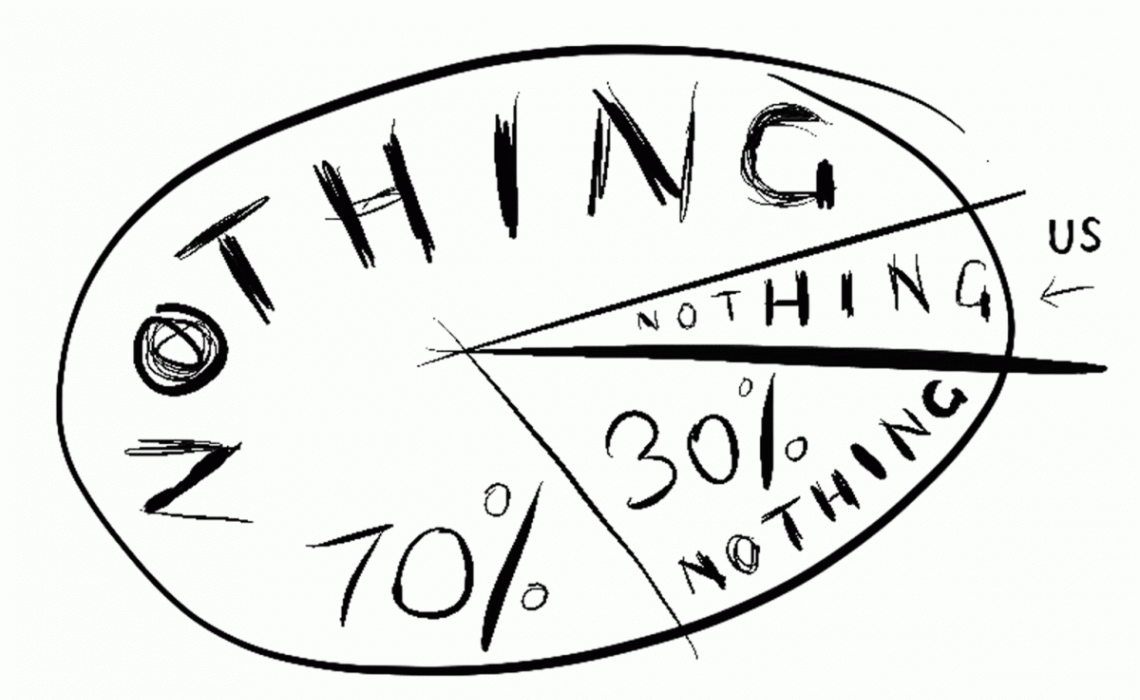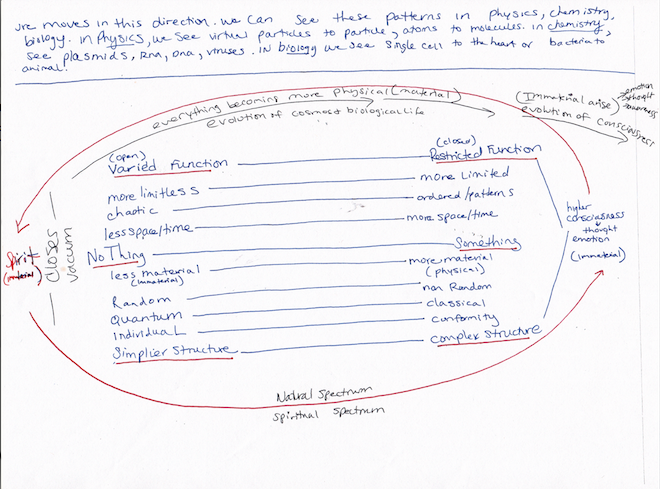But much of its true nature is hidden from us and we don't experience it in its true fullness.
What about Characteristics?
I can’t prove to you God is loving or caring, but I tend to think so. I know love exists. I know care exists and I can’t prove those to you either.
But I do know our brains are a reflection of nature itself. Our brains perceive random and non-randomness and our brains are mathematical. Nature is those three things as well.
So, how did consciousness evolve? how did language? how did love?
You can say it is an accident or planned, either way it doesn’t matter for this purpose, because the point is those qualities now exist and how does something without the innate capability of forming such qualities-form those qualities?
If the universe does not possess consciousness but we do, then are we superior to the universe, to nature? Are only conscious beings able to see, reflect and understand nature and nature itself will never be able to? That is strange to think about because once all consciousness is gone what will nature be then?
It does beg the question whether there is an aspect to this fundamental energy, this fundamental reality, that possess qualities such as these.
But love and care come in a package of living things. We’ve never seen a non-living thing have those qualities, and so we would think then that those qualities would have to exist in a consciousness inside a brain of a living thing at least, if not living in the same form as ourselves.
What about consciousness? Intelligence?
We find these two qualities in highly complex begins, humans as the example. We find humans with intelligence and consciousness; however, it took a lot of time for them to acquire this and we have no examples of either existing without space or time or a physical body that developed into something complex.
But I would argue that our consciousness and intelligence is very limited and in fact is limited because our physical bodies our bound by our space-time. However, HOW do electrons know what other electrons they are entangled with are doing? Because they are not bound by Time. They are not physical like we are, but are on a more simple energy form. So, God's "consciousness" would act like the quantum universe...perhaps in a very mathematical way, so much higher than our our understanding, that we fail to conceive of it entirely and understand it fully.
Electrons seem timeless. They jump from one shell to another or travel across space and time instantly.
So, if electrons can be timeless and do this, why couldn't a spiritual energy also know things in a way unfamiliar to us? Exist timelessly? Perhaps a spiritual energy is the most simple and fundamental form of energy. Or another aspect of it.
In a sense this could be called a consciousness, but that would also limit what it actually is because in fact our ideas of consciousness are limited to our very understanding of it which exist in our minds which have limits because it exists inside of a brain in a body in space-time.
This is the same with intelligence. When we say this is intelligent. What does that mean? Does this mean God has an IQ of 200? It is very limiting and in fact our own understanding of intelligence is very limited by our own experiences.
So- God's intelligence and consciousness would work like nothing we know. It would be boundless consciousness and intelligence. Limitless. Quantum.
Because of this, it would also come in a simple form. I propose this simplest form is Spiritual energy.
However- we could use an argument that is more of a physical (measurable) form.
The main question is does consciousness or can consciousness exist as a simple, fundamental form of reality? or can it only exist as a side effect of a more complex living thing?
Well, we know from the above God could not be complex. So, whatever this consciousness is it would have to be on the scale of simple and fundamental. We do see the quantum nature of things showing us this possibility. So, God would have to fall toward the quantum sphere.
Does consciousness have to exist in a living thing. Are computers living? I would say no, because they are not born naturally and while they do die and do need energy as food, they don’t grow. Although, a self learning computer could be argued to be growing. But they still were not born naturally, they were made by man. So, by scientific current definitions of living I would say they are not living.
Yet, perhaps on another planet there are beings that are fully silicon based and live as “computer people” or hybrids of half-silicon and half-carbon. So, there may actually be examples out there that we don’t have of computer type of entities that are living because they were born.
However living things are not only born, they die, need food, and grow.
God would do none of those things (except possibly grow)
In fact, you could argue the energy of the entire universe is like one big quantum computer that at some fundamental level was born, will die and eats other energy to grow. But then does it ever really change since it always remains fundamentally the same stuff?
Could that entity possess consciousness?
If computers are found to be able to have consciousness I would argue that for sure a God could have consciousness and in fact it could be like the consciousness of a quantum computer.
This is how consciousness exists without being a living thing as we are used to seeing consciousness appear.
HOWEVER, By definition God is infinite and so how would God die? If God couldn’t die, then God is not living by standard definitions either. God doesn’t eat and God doesn’t grow. (Or does he?)
This doesn’t mean God doesn’t have a consciousness. This simply means by our definitions of what qualifies a living thing, in order to be living you must also be able to die and if you can’t then you are not living. Our Computers then are not truly living either, because they were made, not born. However, one day they may be shown to acquire consciousness.
I’m not sure if our computers can have a true consciousness —following in the work of Hameroff and Penrose— which makes this job much more difficult, but the argument for a consciousness in a computer is sometimes compelling and when looking at the quantum level of nature and the possibilities of quantum computers, one has to wonder if these dreams will one day prove to become reality.
Then, I’d have to really wonder if the quantum universe truly is conscious on some level. Because if quantum computers can acquire consciousness that does leave the spooky door open for the possibility of our quantum universe itself.
So- we’ve determined the basic characteristics of God as possible..such as infinite, illimitable, eternal, knowing all, everywhere. This is possible because we see this in the nature of the quantum world. This is possible, not just an idea written about...whether a god exists and can do this is not shown yet, but nature does provide us with the knowledge now that these characteristic are possible.
We’ve determined consciousness could be possible without a “living thing” and since this consciousness would exist in a quantum level ,this consciousness is not complex either, it is as simple as you get —limitless quantum consciousness so to speak.
But can consciousness exist in a simple —not complex- living thing? Well, by our current definitions of living, no. But then God wouldn’t eat and metabolize and God wasn’t born and won’t die- but if the universe is another aspect of god then in a sense that could be true.
So, the important part here isn’t whether God would be living by our scientific current definitions, but whether God would have consciousness?
And what if the real definition of being alive was truly broader? What if being alive didn’t have to include the scientific current understanding of “living thing”. What if being alive just meant a conscious entity. This would definitely include our computers—because being born would not be a hang-up.
In fact, the quantum universe is kinda acting like a mother, giving birth to all kinds of non-living and living things. Except, is this universe alive and conscious?
I would propose that true reality is that which we don’t see, hidden or unseen. I would propose it is in this where energy is alive and acts like a conscious quantum computer. And the moment it is seen by us or by nature, it behaves in accordance to our natural laws.
Consciousness can do all kinds of things from what we’ve seen in nature and in ourselves. It can communicate. It can understand spacial concepts, mathematical concepts, randomness, non randomness, it can have relationships with other non-living things and living things and even with itself. It enjoys music and create sounds.
So God would be a simple infinite illimitable eternal quantum conscious spirit so to speak. But then I'd also argue every definition we impose on God , limits God and God is limitless...so the definition would not truly suit either.
But it is also possible this consciousness is not derived from the quantum aspects, but derived from the spirit itself and that the quantum nature of the universe simply facilitates this spiritual consciousness.


